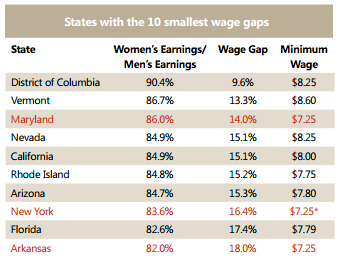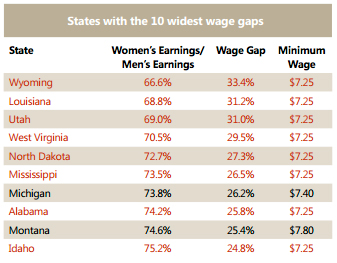Why the minimum wage is a gender issue
Raising the minimum wage could close the salary gap between men and women


A free daily email with the biggest news stories of the day – and the best features from TheWeek.com
You are now subscribed
Your newsletter sign-up was successful
States with higher minimum wages typically have lower gender wage gaps and vice versa, according to a new study released Wednesday by the National Women's Law Center.
Using Census data, the NWLC found that of the 10 states — including Washington, D.C. — with the slimmest disparities between men's and women's earnings, seven had minimum wages set above the federally mandated floor of $7.25-per-hour.

In contrast, among the 10 states with the widest wage gaps, eight had minimum wages at the federal minimum — including all six of the states with the least equitable wage differences.
The Week
Escape your echo chamber. Get the facts behind the news, plus analysis from multiple perspectives.

Sign up for The Week's Free Newsletters
From our morning news briefing to a weekly Good News Newsletter, get the best of The Week delivered directly to your inbox.
From our morning news briefing to a weekly Good News Newsletter, get the best of The Week delivered directly to your inbox.

Washington, D.C., which boasted a minimum wage of $8.25-per-hour, led the way with the slimmest wage gap; women there made 90.4 percent of what men earned. Meanwhile, women in Wyoming, Louisiana, Utah, and West Virginia — all states with a $7.25 minimum wage — made roughly 70 percent of what men did.
A primary reason, the group said, is that women made up two-thirds of all minimum-wage jobs in 2012, and they held a similar share of tipped occupations, too. As a result, the study found that women overall earned about 77 cents for every dollar their male counterparts earned.
"Raising the minimum wage would help close this gap by increasing wages for workers at the bottom of the spectrum," the report concluded.
Other studies have pointed to a more nuanced picture of what's driving the wage gap.
A free daily email with the biggest news stories of the day – and the best features from TheWeek.com
The Organization for Economic Cooperation and Development, in a report last December, suggested that "stereotyping" pushes women from a young age to pursue lower-paying, less equitable jobs.
Separate analyses of the U.S. labor force bear out that point. A Payscale survey found that women were far more likely to pursue careers "with a large societal benefit, but small monetary benefit," and that the wage gap was mostly concentrated at the executive level. Male CEOs were vastly out-earning their female counterparts, but low-level employees of both genders were earning more comparable wages.
Another study by the Center for American Progress similarly concluded that the pay gap was worst at the high end of the wage spectrum.
Furthermore, a study published last November by the nonprofit National Bureau of Economic Research suggested women were more reluctant than men to negotiate for better pay. That led them to start off at a lower wage than men, and made it less likely they would ever catch up.
For example, we find that when there is no explicit statement that wages are negotiable, men are more likely to negotiate than women. However, when we explicitly mention the possibility that wages are negotiable, this difference disappears, and even tends to reverse. In terms of sorting, we find that men in contrast to women prefer job environments where the 'rules of wage determination' are ambiguous. This leads to the gender gap being much more pronounced in jobs that leave negotiation of wage ambiguous. [NBER]
As for D.C.'s impressively small wage gap, there may be another explanation altogether: The perks of federal employment.
From The Washington Post's Sarah Halzack:
Because of its clearly defined pay scales and the fact that its salary information is publicly available, "There's a little more fairness in the way that wages are set," said Sarah Crawford, director of workplace fairness at National Partnership for Women & Families.
Government workers or prospective employees can often leverage such information in pay negotiations, said Fatima Goss Graves, vice president for education and employment at NWLC. [Washington Post]
President Obama, in his most recent State of the Union address, called for a $9 minimum wage. Sen. Elizabeth Warren (D-Mass.) then went even higher, suggesting (perhaps only semi-seriously) that the minimum wage should go up to $22-per-hour to match workers' level of production.
Neither proposal seems likely to pass. In lieu of that, several states are looking to increase their minimum wages. Most recently, New York Gov. Andrew Cuomo (D) signed into law last month a bill to gradually raise the state's minimum wage to $9 by 2016.
Jon Terbush is an associate editor at TheWeek.com covering politics, sports, and other things he finds interesting. He has previously written for Talking Points Memo, Raw Story, and Business Insider.
